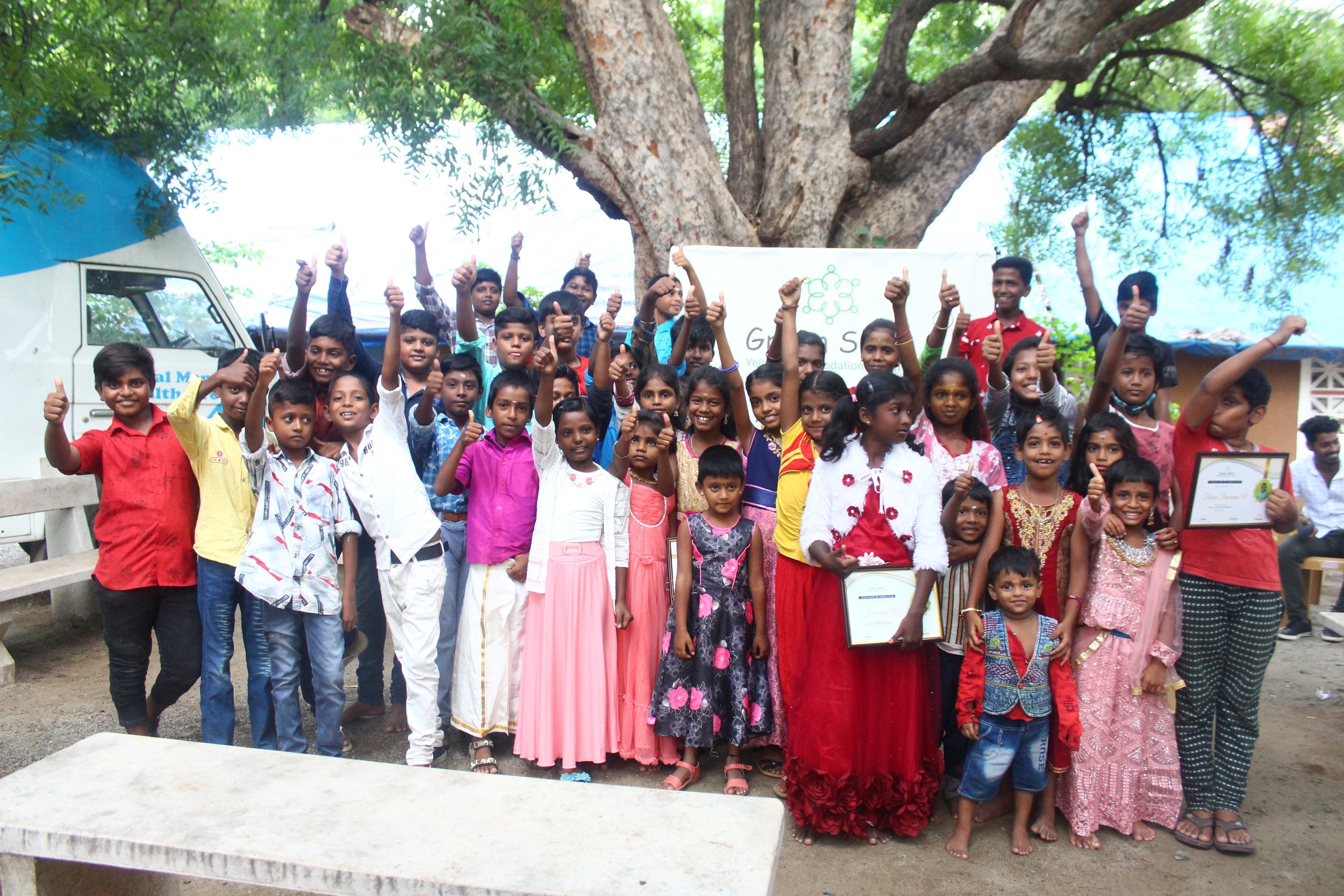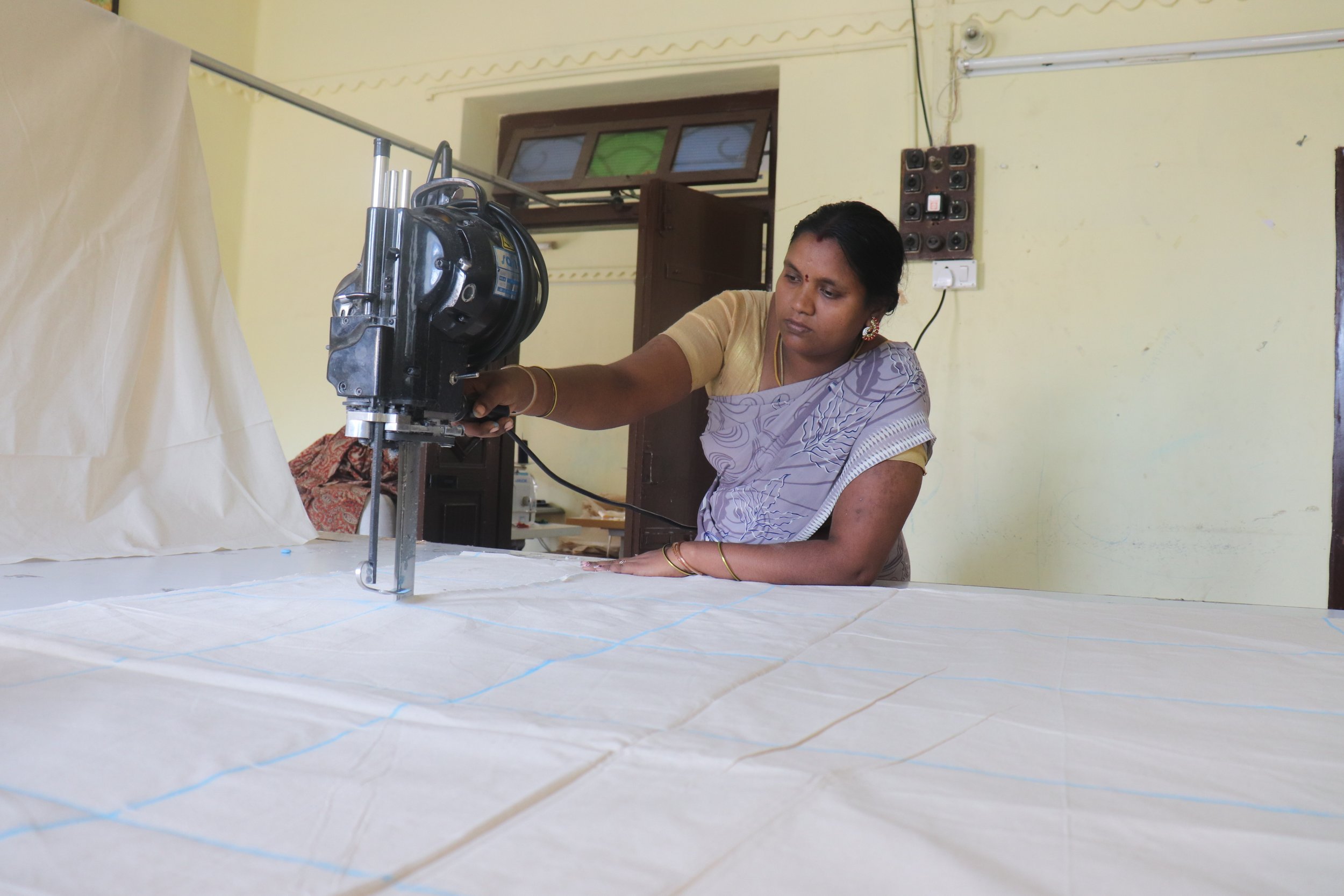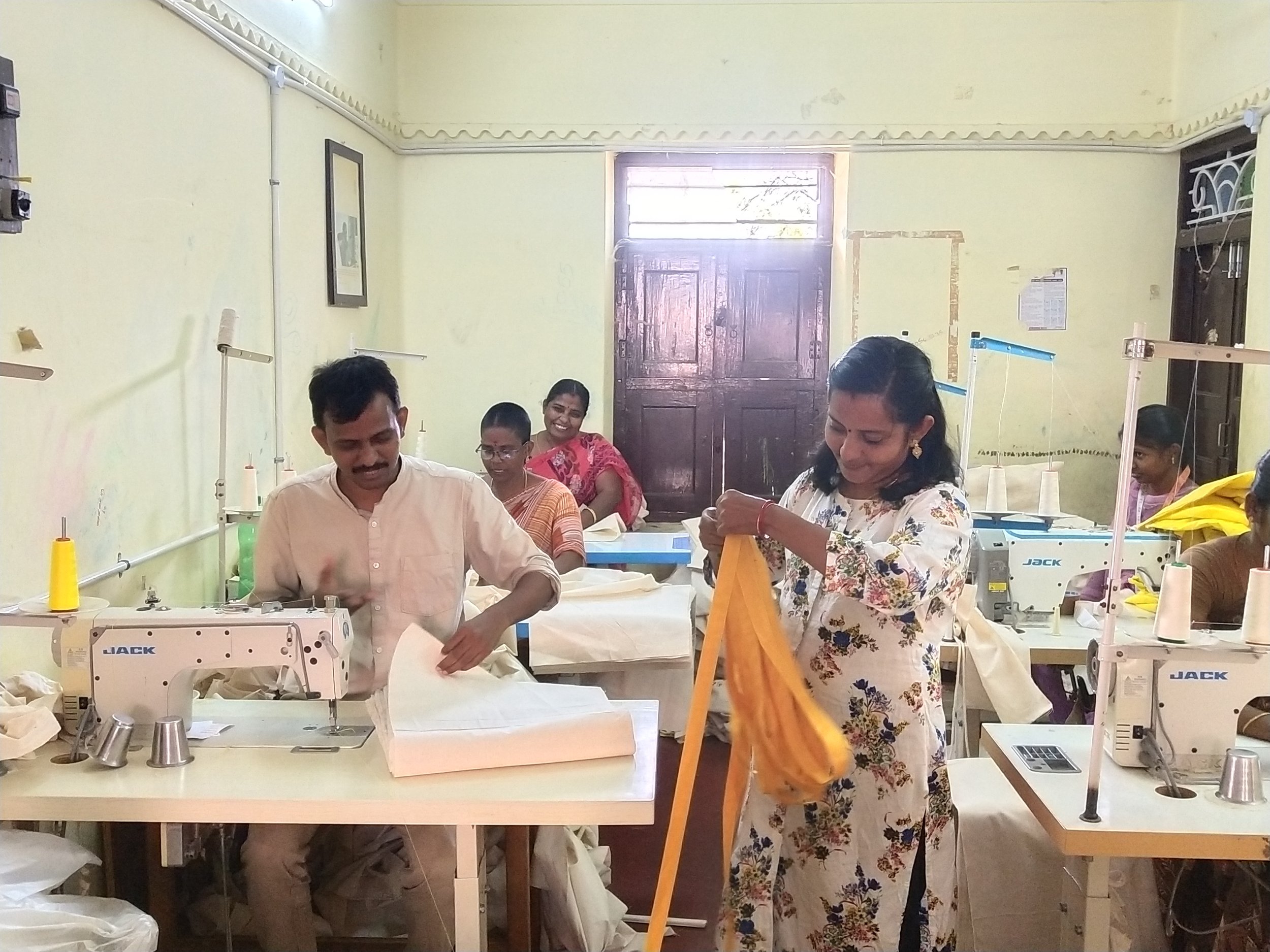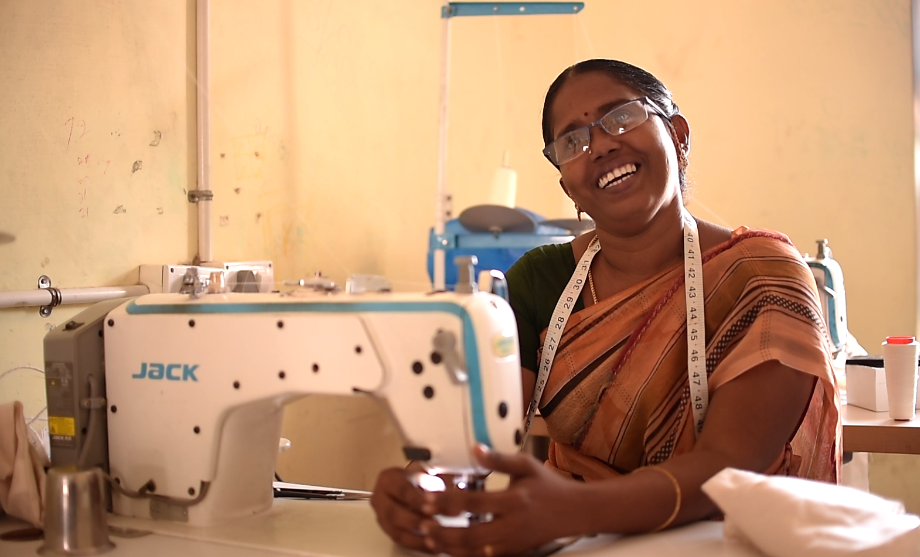Gowri RG and Krishnan Subramanian, Founders of YellowBag
YellowBag is a family run business that focuses on sustainability and livelihoods by working with women to make cloth bags as an alternative to plastic bags. Gowri RG and Krishnan Subramanian were inspired to find a way to make a difference after they became parents. At the time, their house was next to a small dumping ground. It was impossible for them to ignore the impact something as small as a plastic bag might have on their child's future. They began to think about what actions they could take as a family.
Krishnan is driven by the idea that small actions can make a big difference. Making the decision to use a cloth bag instead of plastic is actually making a decision on behalf of the planet. They decided as a family to make these small sustainably driven changes to their lifestyle and carried that philosophy over to their business model. Krishnan and Gowri wanted to bring this behavioral change to more people. They started by promoting cloth bags and then eventually started making cloth bags. As their business grew, they realized they were actually touching the lives of many people, especially the women who they employ.
Aditi Das sat down with Krishnan to learn more about how YellowBag is working towards a better future.
Q. What inspired you to start YellowBag?
The realization of how our actions as individuals affect the planet, is how YelloBag started. My wife, daughter and I used to live in Chennai and we had corporate jobs in MNC's. Both of us are from Madurai, a small city but then we moved on to multiple metros for work.
I feel we live in a very interconnected environment because of the planet's ecosystem. My wife, Gowri and I, got a little more aware about it after we became parents since we had a small infant at home, for whom even the air quality can affect, and our house in Chennai had a small dumping ground next to it. This is when we gained awareness about climate change and the environment. We started thinking about what action we can take as a family. As a family, you can probably try new sustainable products to help change your lifestyle, but how can we take the idea of sustainability further? That is when we started with a simple idea of a cloth bag.
Q. What experience did you have that made you pivot and become an entrepreneur? Did it happen after you had your baby or was there something else to it?
I had very small attempts in entrepreneurship before, but after graduation, I worked in the banking sector. I received my MBA and then I worked primarily in skill development like HR and training. That was my career for about 10 to 12 years and Gowri was in software for the same duration. In between I took a break and attempted to start my own company, though in a very different sector, but that I exited soon. Becoming an entrepreneur was something that I was not really scared of doing. It felt very natural to me, shifting from a salaried job to my own venture. The driving factor was that if we don't do it now then we were not sure if we would get an opportunity to start something like this in the future again. We felt it was the right time for us to start because the idea was bright and the need was high. I had a little money in my pocket which would take care of my family and I for a year plus I have a strong connection with my city, Madurai, so I wanted to come back and produce bags from here. These were the situations which favored me as I transitioned from a regular job to entrepreneurship.
Q. Why did you decide to formulate a business model with such a strong emphasis on social impact? Is there a large-scale problem that you are looking to solve?
The primary concern is that we, as the current generation, have a very big impact on how the next generation looks and we can positively as well as negatively influence them. Our actions today will determine the quality of life of the future generations. I think if people living on the planet right now don't do the right thing, then the future will be impacted. This is again very connected to me becoming a parent.
From a problem perspective, I noticed two things. One - in general, day to day life as well as businesses, we don't see nature as a stakeholder. Nature has always been abused and the role that nature plays in our everyday life is not properly understood and given importance. So, if I'm doing something, I want to do it after understanding nature's contribution in our everyday life and how we are really connected. Second - I think overall as a society, especially in India, we continue to face the problem of income inequality. So, if business could help the vulnerable from low income groups, if a collaborative business could walk with them, we feel it would make a difference. Anyway, we have limited time and resources, so why not work on these problems rather than doing something which the world has already done and we already have found solutions for. We could spend our time on finding solutions for the problem which we have not yet addressed. I think that is what every conscious person could attempt to do. That is why we designed YellowBag as an environmentally, as well as socially conscious organization.
Q. I think that the kind of problem that you're trying to solve was really well put together. Just shifting gears now a little. It's been quite a few years since you've been an entrepreneur and have lived the entrepreneur life. So have you faced any unique challenges as an entrepreneur? And can you speak a little about the challenges and how you dealt with them or if you're still dealing with them?
I think whether it's a social enterprise or a general enterprise, the challenges seem to be very common. However, being a first generation entrepreneur, with no exposure and no network within the entrepreneur community, I had to deal with everything at the same time. We had no real knowledge in the family or in our immediate network on how to run a business. Things took some time, took some learning, but I think more than being an entrepreneur, being a first generation entrepreneur with no connections was a challenge for the initial couple of years.
Later on though operations took a turn, as we started working with a lot of women who make the bags and we became a production as well as a marketing organization. We evolved into a product company, but there's a lot of things that we did not plan for. It was organic, from the beginning we started working with a few women, then a few communities, then a few villages - only to stabilize it and centralize it to the city. There were a lot of experiments on what can and cannot work, but it drained our resources initially. To cover the gap we had to make sales as we had no other funding opportunity.
As an organization our primary challenge is to make quality bags since we are also employing first time tailors, just as we are first time entrepreneurs. These women have not had any employment opportunities in the past since they did not have access to opportunities at their community level. We set up a unit in their community so it can be like their second home where they can come and stitch the bags. Since they were also first time employees we had to deal with all the problems that come with that, like training them, equipping them, quality assurance, production, and time. All these operations evolved in time for us since we could not copy any existing model. If you want to start a garment you can replicate what is already done elsewhere, but in our case we had to learn on our own. This was our primary challenge that we faced initially, but now we are at a point where we can set up systems and processes plus we have people with us to run operations at various levels. The current challenge we face is marketing the products to the global audience. It is a continuous learning journey which depends on how fast we can learn and implement the challenge we are facing.
Q. So talking more about the women whose lives you have changed. Are there any jobholder stories that have affected your life or made you want to do what you're doing even more?
After we started our first unit we met Panjavarnam, a woman who got the opportunity to earn for the first time. In small communities the husband is the primary breadwinner. Because these women have grown up in that environment, they do not see themselves as someone who can go out and earn. Each community will have a small subset of women who still feel this way so they don't have the courage to go out and work. They cannot travel 2 bus stops away and work as the work timings force them to be completely away from their families. Whereas these women want something close to home and which is as good as home. This is a very tough opportunity to get since there is social pressure on them to take care of the family, the children, the elderly, etc. We set up our first unit in the community where women could walk just 500m from home to work in a dignified manner. They have company plus the place is safe. The women respect each other, so building a structure like this is what I call a true success. More and more women have started joining since we began operations, women who otherwise would not have got a means to earn. They are also able to see the transformation in the terms of respect that they get in the family, the kind of contribution they can provide, the kind of education their children have access to, and their overall self esteem too. In that case there are many women who have been working with us for more than 5 years and their confidence level from day one to now is significantly higher. From nobody to influencers in their communities, these women have come a long way! This keeps us going as we can see this happen with every person who is joining us as a tailor.
Panjavarnam even won the “Womens Day Award '' in the Districts HR Forum, for which she had to travel to another district with her daughter. Her daughter witnessed her mother getting awarded in a room full of distinguished businessmen and entrepreneurs. This event will be cherished by her daughter for a lifetime as her confidence level has increased and it will help her forge her own path.
Q. What is your vision for your company?
Our ultimate vision is that we want people to inspire more people to act for the planet. This is our core vision. We want to influence people's everyday decisions by considering the planet as a stakeholder. This is the goal of our organization even from a long term perspective. The economic impact we create with our products is our journey towards it! We want people to understand the urgency to act for the planet.
Q. Is there anything that is keeping you up at night?
As an individual, my window is focused more on today's problem. Whereas, my vision is more of an ethical framework that I feel is now more or less, our DNA. But the question that keeps me up is, “Are we generating enough business opportunities to keep all these women employed?” The number of women we can employ over a period has changed drastically. It has increased, decreased, and during COVID it went down to 0. Now we are working with 35 women and everyday I think about if I have enough work to increase the earnings of these 35 women.
Q. What are some of the key insights you've gained after working in this particular sector? Were there any Aha! or Oh no! Moments?
I feel the entire ecosystem is very appreciative of such work. Starting from all the support you receive for an initiative that focuses on the environment and livelihood creation. During our initial days a lot of magazines wrote about our work and we did not even do PR or any such thing. We just ensured the action we are taking does not stop and the coverage in terms of news happened automatically. The benefit was that this significantly reduced the resources that we would have drained for visibility otherwise. This was a huge support for us! At this stage there are organizations like Upaya and YSB which help share knowledge and expertise across industries and geographies which is helping to save our energy. All this is happening since our action is right, this will always be an Aha! Moment for us.
Q. What is the piece of advice that you would like to give to other aspiring entrepreneurs?
I would highly recommend them to stay rooted to their purpose. Whatever objective the entrepreneur starts with to solve a problem, if the purpose is clear from the beginning, this is the key.
The way the economy is built and the current business practices are, it will always try to take us away from the purpose. If it's a social enterprise its purpose is very different from the current economic structure. Unless we keep ourselves rooted to the purpose, there is a high probability that we will find ourselves disseminating into the current structures. The current economic structure is such that business and lifestyles are contributing negatively to the planet. If the purpose is to positively contribute to the planet then the purpose has to be absolutely clear in every decision that is taken, day in and day out.

















The Tribal Hermit is a social impact venture that works closely with 130+ Dhokra craft artisans from Kondagaon, Bastar, and Raigarh districts of Chhattisgarh to design, create, and sell their products.